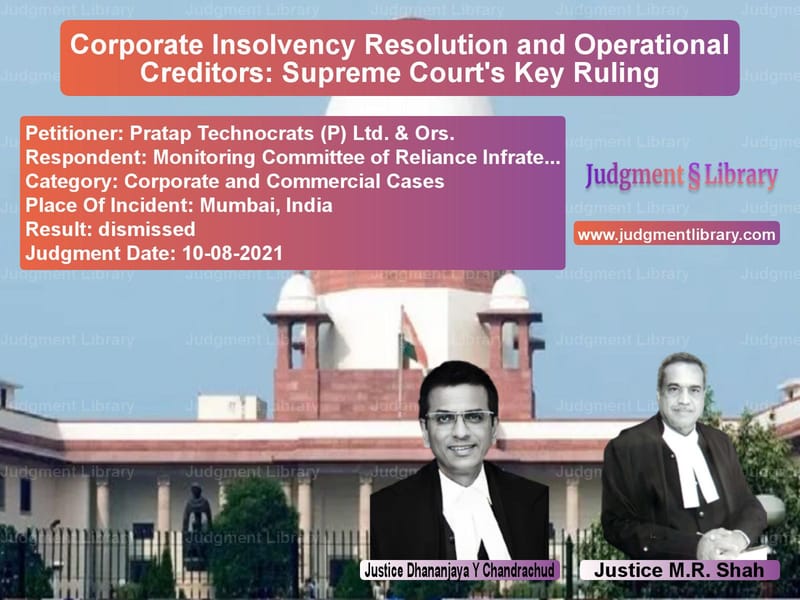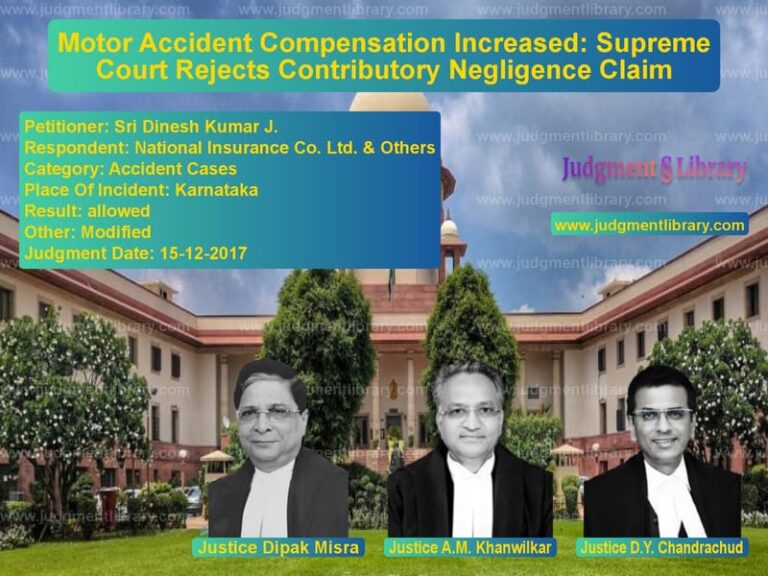Corporate Insolvency Resolution and Operational Creditors: Supreme Court’s Key Ruling
The case of Pratap Technocrats (P) Ltd. & Ors. vs. Monitoring Committee of Reliance Infratel Limited & Anr. is a landmark judgment under the Insolvency and Bankruptcy Code, 2016 (IBC). It primarily deals with the approval of a resolution plan and the concerns of operational creditors who challenged the process, citing unfair treatment.
The appeal was filed against the judgment of the National Company Law Appellate Tribunal (NCLAT), which had upheld the approval of the resolution plan for Reliance Infratel Limited (Corporate Debtor). The operational creditors, who provided key services to the company, contended that their claims were not treated fairly and equitably under the resolution plan. However, the Supreme Court ruled that the resolution plan was valid and complied with the requirements of the IBC.
Background of the Case
The insolvency resolution process of Reliance Infratel Limited was initiated on May 15, 2018, when the National Company Law Tribunal (NCLT) admitted the company into the Corporate Insolvency Resolution Process (CIRP). A Resolution Professional (RP) was appointed to manage the process.
Read also: https://judgmentlibrary.com/corporate-debt-and-insolvency-understanding-the-landmark-judgment/
The CIRP involved the following steps:
- The Resolution Professional invited Expressions of Interest (EOIs) from potential resolution applicants.
- Fifteen EOIs were received, and the Resolution Professional shortlisted four applicants.
- The Committee of Creditors (CoC) approved the resolution plan of Reliance Digital Platform & Project Services Limited, a subsidiary of Reliance Jio.
- The plan was approved unanimously, with 100% voting share of financial creditors.
Petitioner’s Arguments
The operational creditors, led by Pratap Technocrats (P) Ltd., raised several objections against the resolution plan. Their primary arguments were:
- Unfair treatment: They contended that the plan allocated a disproportionately low amount to operational creditors while financial creditors received a much higher recovery.
- Lack of transparency: They argued that they were not provided with enough information about the resolution process.
- Misclassification of assets: They claimed that certain assets worth Rs. 800 crore were reserved exclusively for financial creditors, which was unfair.
- Violation of IBC: They alleged that the plan violated Section 30(2)(b) of the IBC, which mandates that operational creditors must receive at least the liquidation value of their claims.
- Non-compliance with natural justice: They argued that they were not given an opportunity to participate effectively in the resolution process.
Respondent’s Arguments
The Monitoring Committee of Reliance Infratel Limited, representing the financial creditors and the Resolution Professional, countered the arguments as follows:
- Compliance with IBC: The plan met all statutory requirements, including fair treatment of operational creditors.
- Higher recovery for operational creditors: Unlike financial creditors, who recovered only 10.32% of their claims, operational creditors received 19.62% of their dues.
- Commercial wisdom of CoC: The CoC had the authority to decide the distribution of funds, and courts should not interfere in commercial decisions.
- Value of assets: The Rs. 800 crore asset allocation was part of the overall plan and did not violate any provisions of the IBC.
- Judicial restraint: The NCLT and NCLAT had already reviewed the plan, and no legal violations were found.
Court’s Observations
The Supreme Court emphasized the following principles:
1. Commercial Wisdom of the CoC
The Court reiterated that the CoC has the final say in approving a resolution plan, and courts should not interfere unless there is a clear violation of the law.
“Neither the NCLT nor the NCLAT has the jurisdiction to question the commercial wisdom of the CoC.”
2. Treatment of Operational Creditors
The Court referred to previous judgments, including Essar Steel India Limited, which upheld the distinction between financial and operational creditors. It clarified that operational creditors are not entitled to equal treatment with financial creditors.
“Equitable treatment applies only among creditors of the same class.”
3. Valuation of Assets
The Court rejected the argument that Rs. 800 crore was unfairly allocated to financial creditors, noting that this was part of the overall distribution mechanism under the plan.
4. Compliance with IBC
The Court held that the resolution plan complied with all statutory requirements, particularly Section 30(2), which ensures fair treatment of operational creditors.
Final Verdict
The Supreme Court dismissed the appeal and upheld the resolution plan. The key takeaways from the judgment were:
- The resolution plan was valid and complied with the IBC.
- Operational creditors cannot challenge the CoC’s decision on commercial grounds.
- The judiciary must respect the commercial wisdom of financial creditors.
- Fair and equitable treatment applies within creditor classes, not across different types of creditors.
Implications of the Judgment
This ruling has far-reaching consequences for corporate insolvency cases in India:
- Strengthening CoC’s Authority: It reinforces that the CoC’s commercial decisions should not be interfered with.
- Guidance for Operational Creditors: It clarifies that operational creditors cannot expect parity with financial creditors.
- Boosting Investor Confidence: It ensures that resolution plans remain predictable and legally secure.
Overall, this judgment underscores the importance of adhering to the IBC framework while balancing the rights of all stakeholders.
Petitioner Name: Pratap Technocrats (P) Ltd. & Ors..Respondent Name: Monitoring Committee of Reliance Infratel Limited & Anr..Judgment By: Justice Dhananjaya Y Chandrachud, Justice M.R. Shah.Place Of Incident: Mumbai, India.Judgment Date: 10-08-2021.
Don’t miss out on the full details! Download the complete judgment in PDF format below and gain valuable insights instantly!
Download Judgment: pratap-technocrats-(-vs-monitoring-committee-supreme-court-of-india-judgment-dated-10-08-2021.pdf
Directly Download Judgment: Directly download this Judgment
See all petitions in Bankruptcy and Insolvency
See all petitions in Corporate Compliance
See all petitions in Company Law
See all petitions in Mergers and Acquisitions
See all petitions in Corporate Governance
See all petitions in Judgment by Dhananjaya Y Chandrachud
See all petitions in Judgment by Mukeshkumar Rasikbhai Shah
See all petitions in dismissed
See all petitions in supreme court of India judgments August 2021
See all petitions in 2021 judgments
See all posts in Corporate and Commercial Cases Category
See all allowed petitions in Corporate and Commercial Cases Category
See all Dismissed petitions in Corporate and Commercial Cases Category
See all partially allowed petitions in Corporate and Commercial Cases Category







